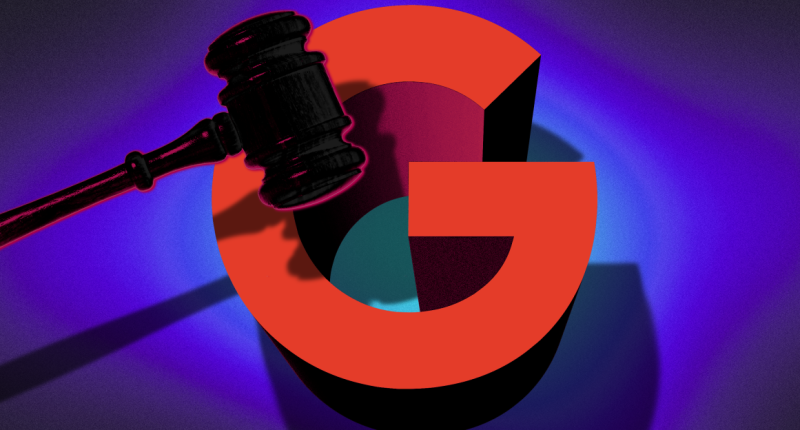Share this @internewscast.com
After half a decade fighting to keep its empire together, Google’s defenses are wearing thin.
The company is currently battling on two key fronts that could significantly alter its future operations, with the US Department of Justice suggesting this could create more opportunities for its rivals. Last year, a federal judge labeled Google as an illegal monopolist in the online search sector, and just recently, another judge ruled that it had similarly monopolized the ad tech market. Starting on Monday, the company will engage in a new phase of the initial conflict: a three-week trial in Washington, DC designed to establish the necessary actions to rejuvenate competition within the online search arena.
Google has committed to appealing both decisions; however, it must first go through the remedies trials for each case. These proceedings will allow the DOJ to push for Google’s division and implement additional restrictions. When court proceedings commence on Monday, the government will advocate for measures like compelling Google to divest its Chrome web browser, sharing search data with rivals, keeping the government informed about new AI ventures, and halting exclusive agreements with browser and phone manufacturers.
In both this trial and the upcoming ad-tech remedies case, judges may decide that milder actions could resolve the issues they believe Google has caused. Nevertheless, this situation represents the most significant antitrust challenge a major tech firm has confronted in the US for many years — the most notable since Microsoft’s pivotal defeat concerning its PC operating system monopoly 25 years ago.
Outside the US, Google has incurred fines for anticompetition charges and had to make business changes to comply with international regulations. But none of these have approached what the DOJ is asking for. If the DOJ gets its way, Google and Apple could end one of the most lucrative partnerships in Silicon Valley, while rivals like Microsoft could get access to some of Google’s most valuable data.
During the first phase of the US antitrust trials, known as the liability phase, Google was defiant in arguing that it has competed fairly to win users with its superior products. In this next phase, Google will be facing judges who have already determined that’s not the case — and Google will be forced to argue for simply limiting the penalties.
The DOJ believes that serious measures are necessary to bust up Google’s search monopoly. Google’s exclusionary deals with Apple, it’s argued, made it exceedingly difficult for even quality competitors to break through. Owning Chrome lets Google control one of the major access points for search engines. And Google search’s popularity means users give it huge volumes of query data that competitors don’t have.
The DOJ also wants to ensure any remedies imposed by the court are future-proof so Google can’t regain monopoly power later on. That’s why it’s included a focus on AI, which it worries could become a major search platform. The government backed off of its request for Google to sell its AI investments after President Donald Trump took office, but it still wants to require the company to notify the government about future investments in the space.
The DOJ wants to ensure any remedies imposed by the court are future-proof
The court will hear from Google executives involved in its Search, Android, and Chrome businesses, as well as executives from online search competitors like DuckDuckGo, Microsoft’s Bing, and Yahoo. AI executives from companies like OpenAI and Perplexity will weigh in as well. Witnesses last time testified about whether Google had taken anticompetitive moves in a definable market; this time the government will use them to argue for why its proposed fixes are important — while Google will argue they could break tools consumers enjoy.
Virginia-based Judge Leonie Binkema has not yet set trial dates for the remedies proceedings in the ad tech case. But in the coming months, both sides will present their wishlists for changing how the company works.
These remedies will likely be more straightforward than those in the Search case. Brinkema agreed with DOJ arguments that Google monopolizes markets through two illegally tied services: a publisher ad server known as DFP and its ad exchange AdX. (She agreed with Google on one count — that it did not have a monopoly in the market for its advertiser-side tools.) The government could reasonably seek to make Google split off one or both.
That might feel less dramatic than a Chrome spin-off. But the ad market Google dominates underlies large parts of the internet economy — it’s where publishers can make money outside big social networks. And these publishers testified throughout the trial that they’re chafing under Google’s whims. Making that ecosystem more competitive could revitalize the open web.
Mehta could rule by the end of the summer on search remedies. And Brinkema — who’s on a court that’s nicknamed the “rocket docket” for its comparatively speedy pace — could also possibly set a trial and make a ruling this year. But Google could push any tangible changes out for years. The company has vowed to appeal the decisions, a route that could take it all the way up to the Supreme Court. Trump’s DOJ could also decide to settle either case, although since several states are also tied into the lawsuits, they could pursue remedies themselves.
Microsoft’s big antitrust loss, famously, didn’t result in a breakup. As George W. Bush’s administration took over the case in 2001, it settled for milder remedies. Even so, experts say the landscape opened up for new, innovative companies. One of those said to be one of the biggest beneficiaries? Google.






